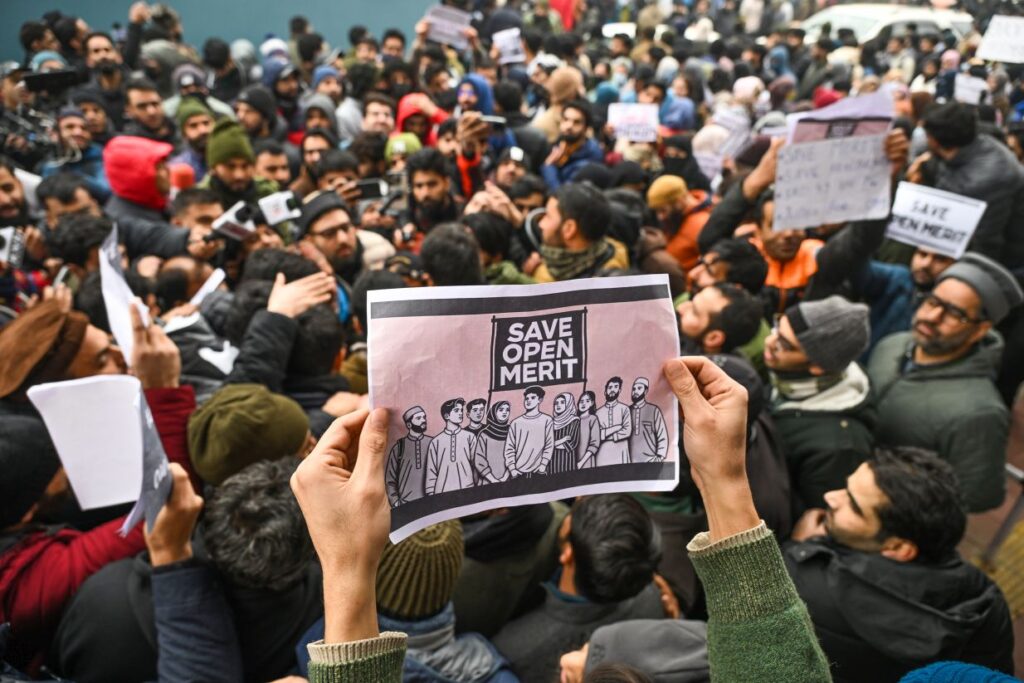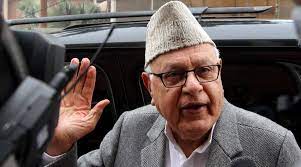Calls for Open Merit Restoration Grow Louder Amid Reservation Restructuring in Jammu and Kashmir
By : Javid Amin | Srinagar | 11 June 2025
A Region at a Crossroads
In the politically sensitive and educationally competitive landscape of Jammu and Kashmir, the reservation debate is reaching a boiling point. As the J&K Cabinet Sub-Committee wraps up its long-awaited review of the region’s reservation policy, citizens across the board—particularly students, civil services aspirants, and opposition parties—are demanding immediate clarity and transparency.
The catalyst? Controversial changes made in 2023, which saw the inclusion of new communities under the Scheduled Tribe (ST) category, thereby shifting the reservation-to-open-merit ratio dramatically—from 50:50 to 60:40. This seemingly technical revision has ignited an emotional and intellectual storm, prompting critics to question its legality, fairness, and long-term social implications.
The Committee’s Report: Finished But Still Under Wraps
Cabinet Sub-Committee Completes Its Job, But Where’s the Deadline?
The Cabinet Sub-Committee, formed earlier this year to assess the impact and fairness of the reservation system, has now finalized its internal report. However, the date of its presentation before the full Cabinet remains undisclosed.
This lack of clarity has fueled public speculation and growing frustration. The demand is simple: if the government is confident in its policy, why not release the report publicly?
Civil society groups and academic associations argue that any document capable of affecting future generations’ access to education and employment should be open to public scrutiny, not cloaked in bureaucratic silence.
Flashpoint: The 2023 Reservation Amendments
ST Status for Paharis, Padaris, Kolis, and Gadda Brahmins Changed the Game
In early 2023, the Union Government passed legislation that added four new communities—Paharis, Padaris, Kolis, and Gadda Brahmins—to the Scheduled Tribes list in Jammu and Kashmir.
While this move was framed as a step towards social justice and inclusion, critics argue that it disrupted the delicate balance of open merit vs reservation-based access to higher education and government jobs.
This amendment raised the total reserved seats to 60%, reducing the open merit quota to 40%, and drawing sharp criticism from students, legal experts, and constitutional scholars.
Public Outcry: Voices Rising from Every Corner
Open Merit Students, Opposition Leaders, and Civil Societies Join Hands
Leading the charge are groups like the Open Merit Students Association (OMSA), which argue that the policy undermines competitive equity, turning the dreams of thousands of deserving students into political casualties.
Prominent political figures such as Waheed Ur Rehman Para (PDP) and Aga Syed Ruhullah Mehdi (NC) have also weighed in, urging transparency and legal scrutiny of the changes.
Opposition parties claim that the BJP-led government is using reservation as a vote-bank tool, rather than as a vehicle for true upliftment.
“You cannot correct historical injustices by creating new ones,” said a student protester during a recent rally in Srinagar.
Legal Concerns: Breach of the Supreme Court’s 50% Cap?
Is the New Quota Regime Constitutionally Valid?
One of the central arguments against the new policy is that it exceeds the 50% reservation cap set by the Supreme Court in the landmark Indra Sawhney case (1992).
While the Centre and UT administration maintain that ‘special circumstances’ justify the expansion, many legal experts argue this rationale could be challenged in court, particularly in the context of J&K’s fragile legal and political setup post-Article 370.
The Counter-Report: Students Take Research into Their Own Hands
In a bold move, the J&K Students Association released an independent report presenting 15 detailed recommendations to restore balance and fairness in the reservation system.
Key Recommendations Include:
-
Conducting a caste-based socio-economic census in J&K.
-
Reverting to the 60:40 open merit to reserved ratio.
-
Introducing a review mechanism to reassess reservation benefits every five years.
-
Ensuring transparency and public disclosure of government committee reports.
“We want justice, not politics,” said a member of the student group.
The Need for Independent Oversight
Civil rights groups and academic forums are now pushing for the establishment of an independent reservation audit committee, preferably led by retired judges or policy experts, to examine the long-term socio-economic implications of the new policy.
They stress the need for empirical data and transparent consultation processes before implementing any drastic changes to the existing system.
Social Justice vs Political Engineering
A Delicate Balance between Representation and Meritocracy
While reservation policies are meant to uplift marginalized communities, critics argue that they are increasingly being used as tools of political engineering rather than social reform.
In a UT as ethnically and religiously diverse as Jammu and Kashmir, such policy shifts can risk widening communal divides and alienating one group in the name of empowering another.
Media and Public Opinion
Local and national media have largely echoed the concerns of students and political opposition, with editorials demanding the public release of the cabinet sub-committee report and greater transparency in future reservation reviews.
TV panels, online forums, and social media have been buzzing with debate, making #ReservationDebateJ&K a trending topic for days.
What’s at Stake: The Future of Youth and Education in J&K
For the thousands of young aspirants preparing for NEET, UPSC, and JKPSC exams, this isn’t just about policy—it’s about livelihood, identity, and opportunity.
There is growing concern that merit-based students, particularly from lower-middle-class backgrounds who don’t fall into reserved categories, are being pushed to the margins in the name of populism.
Bottom-Line: Transparency Is the First Step to Trust
If the government of Jammu and Kashmir is serious about inclusive growth, then it must start by releasing the report of the Cabinet Sub-Committee on reservation policy. Dialogue, data, and democratic debate must take precedence over hush-hush bureaucracy.
This issue is far too important to be decided behind closed doors.



